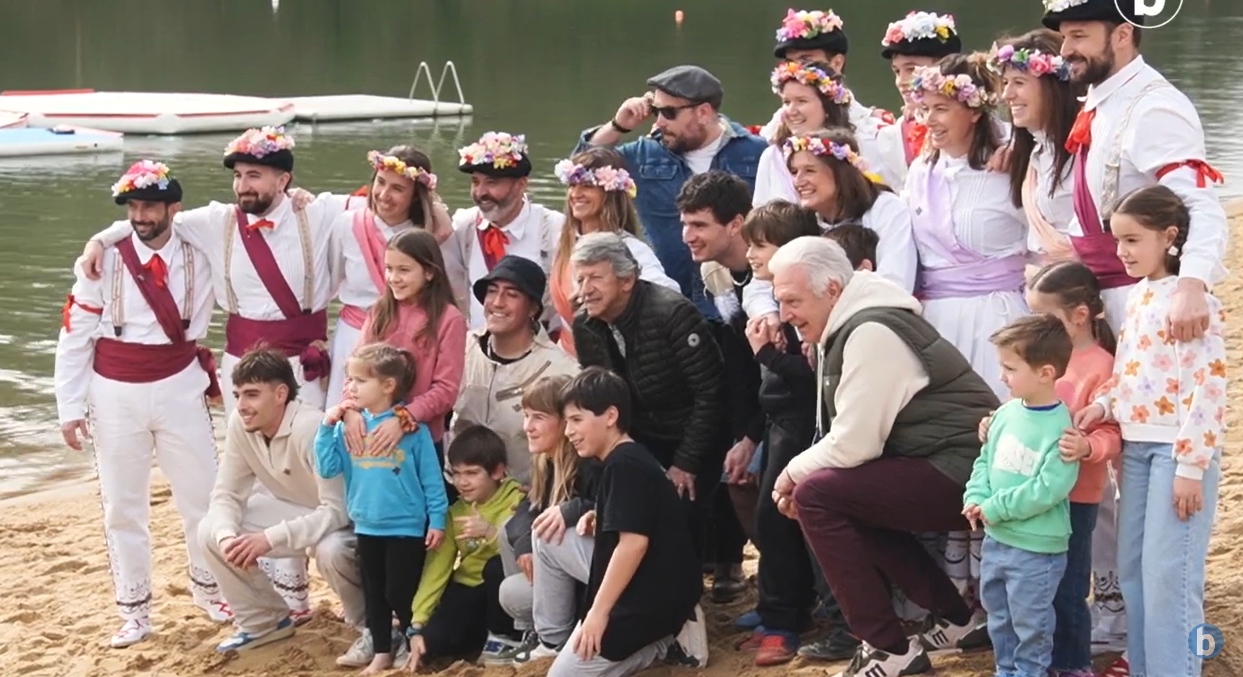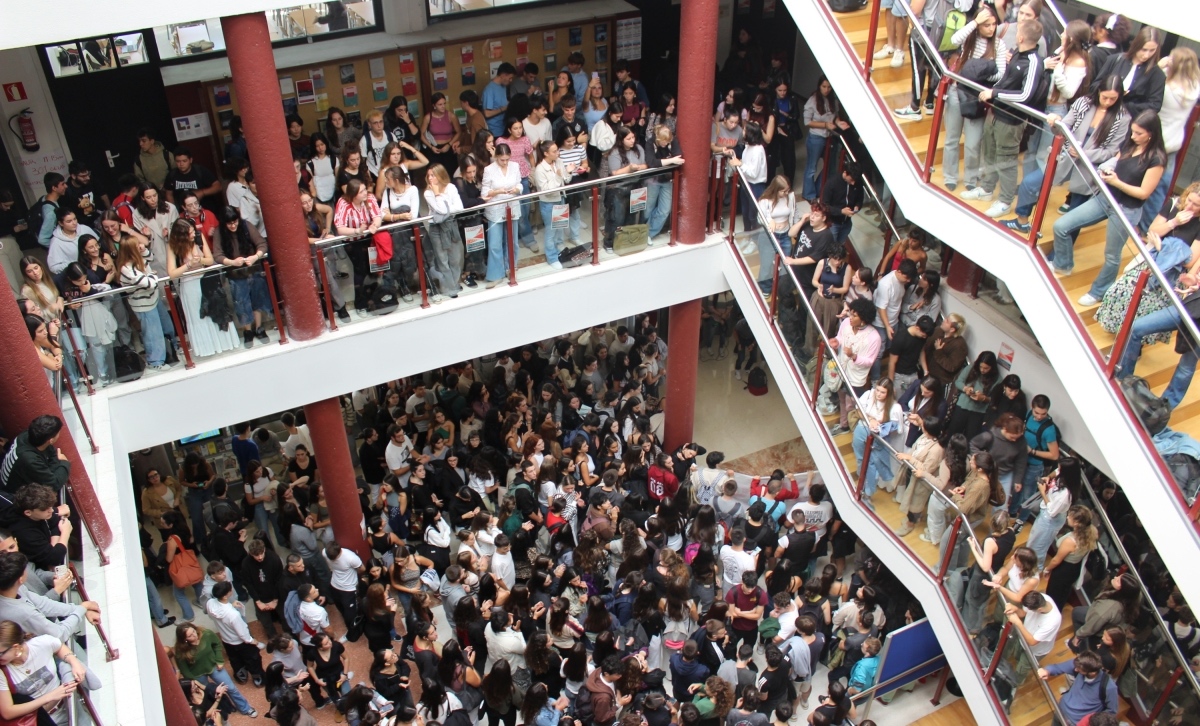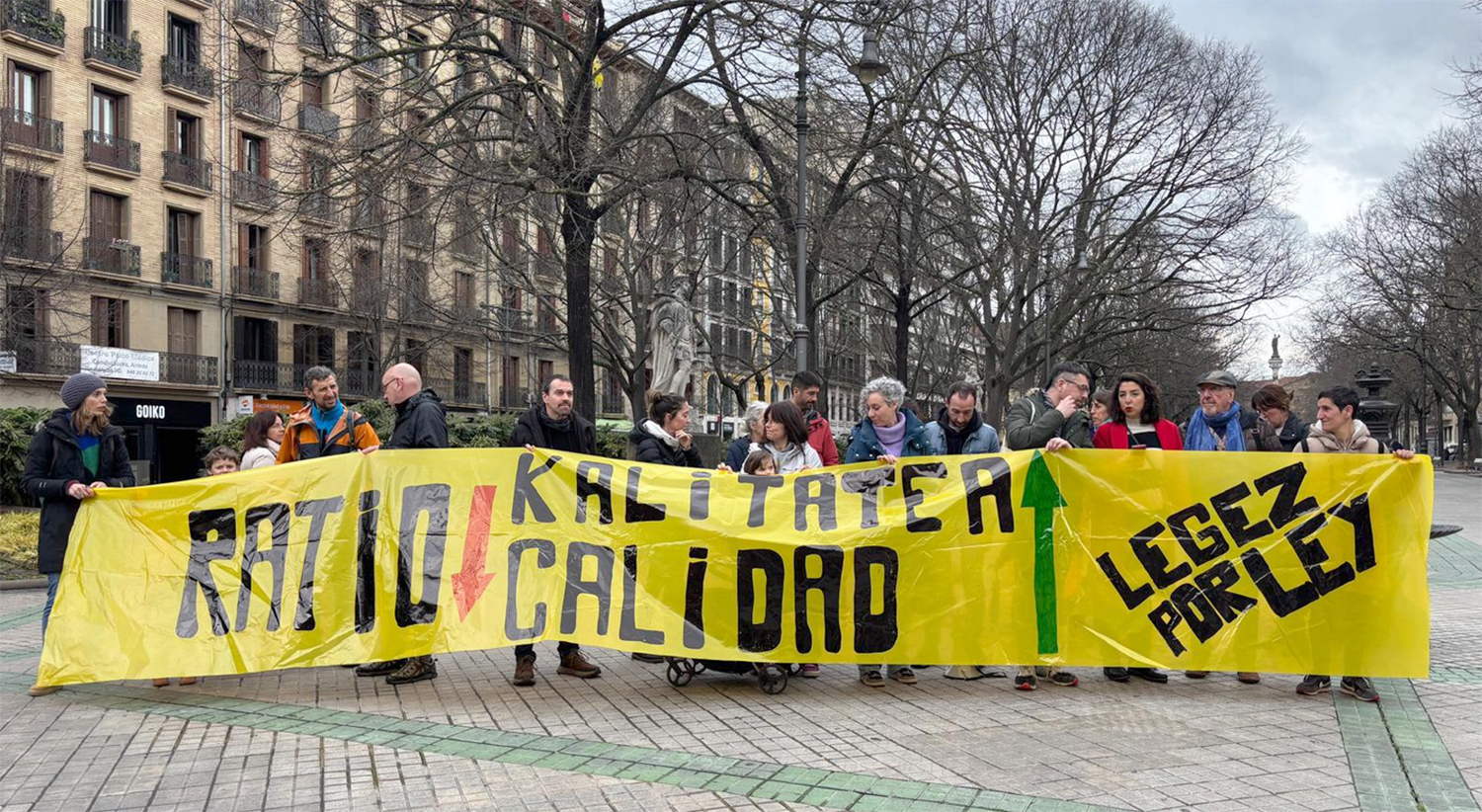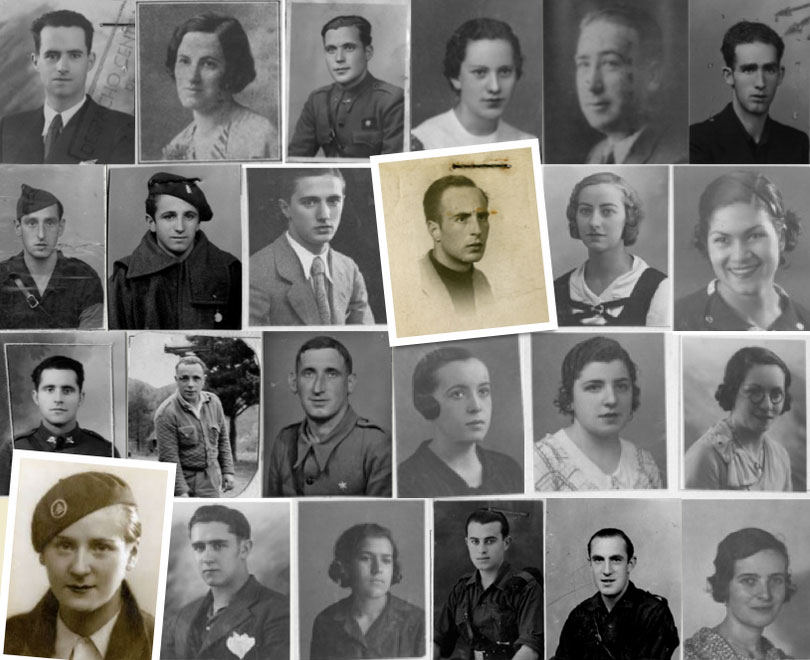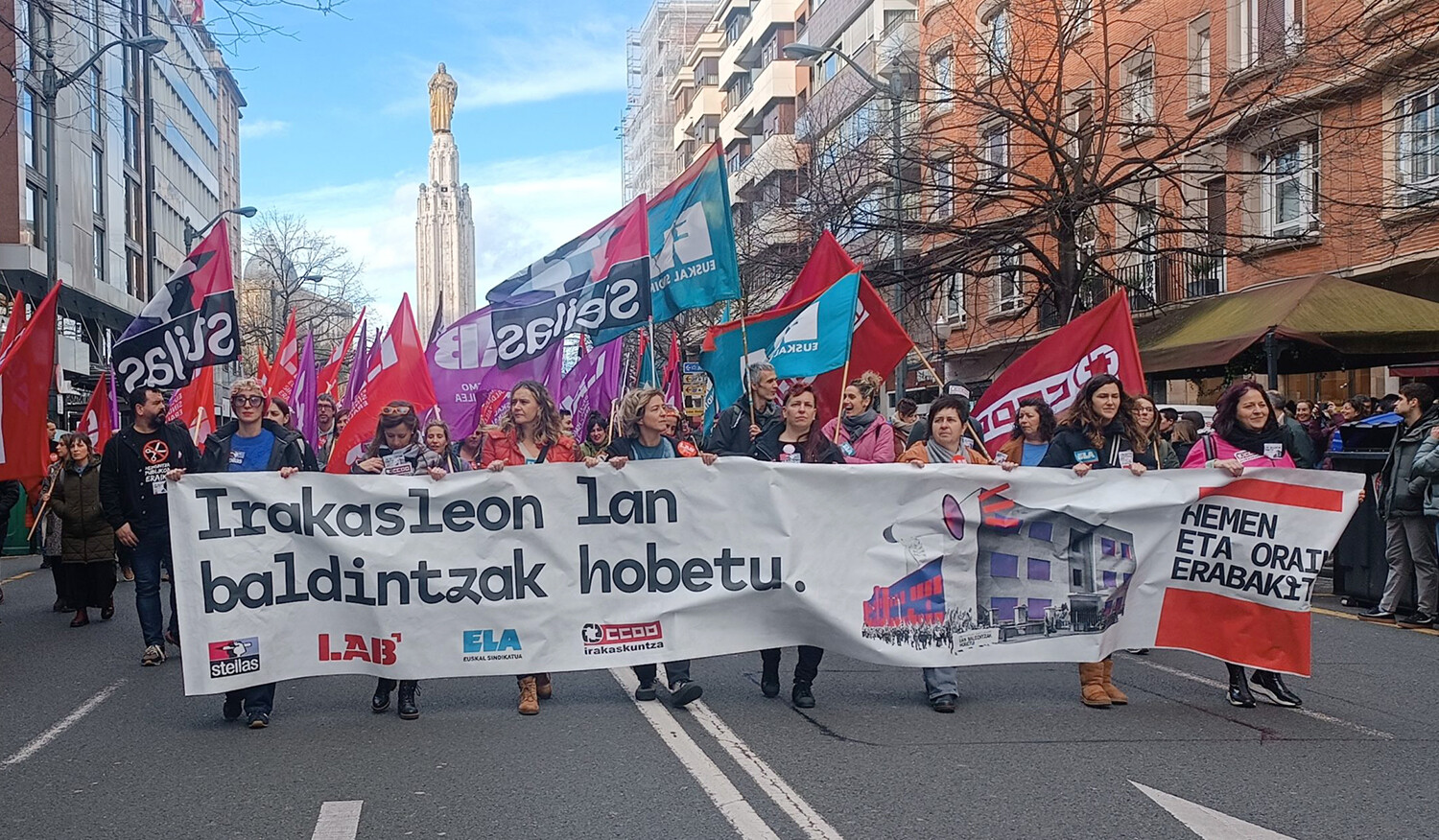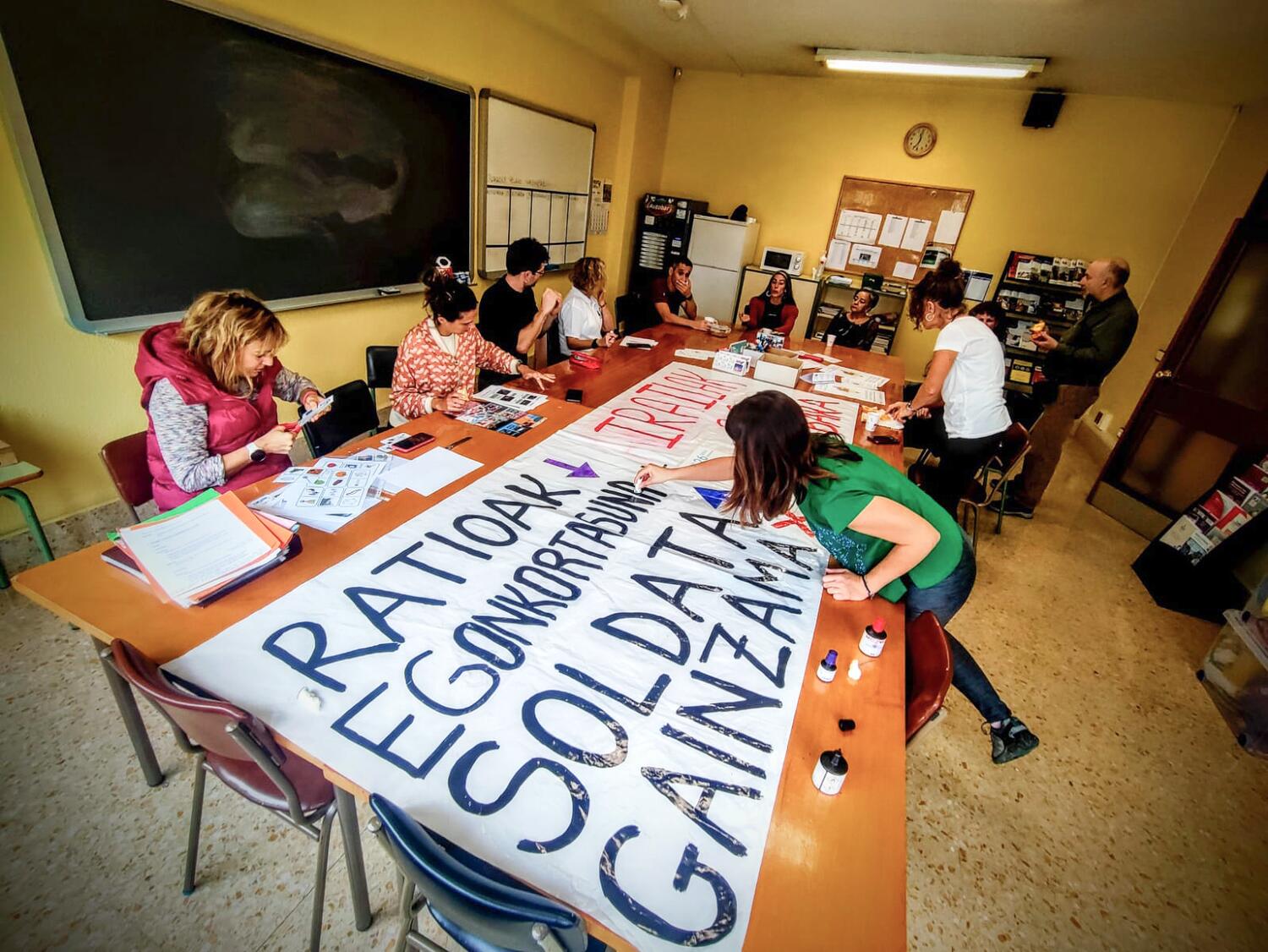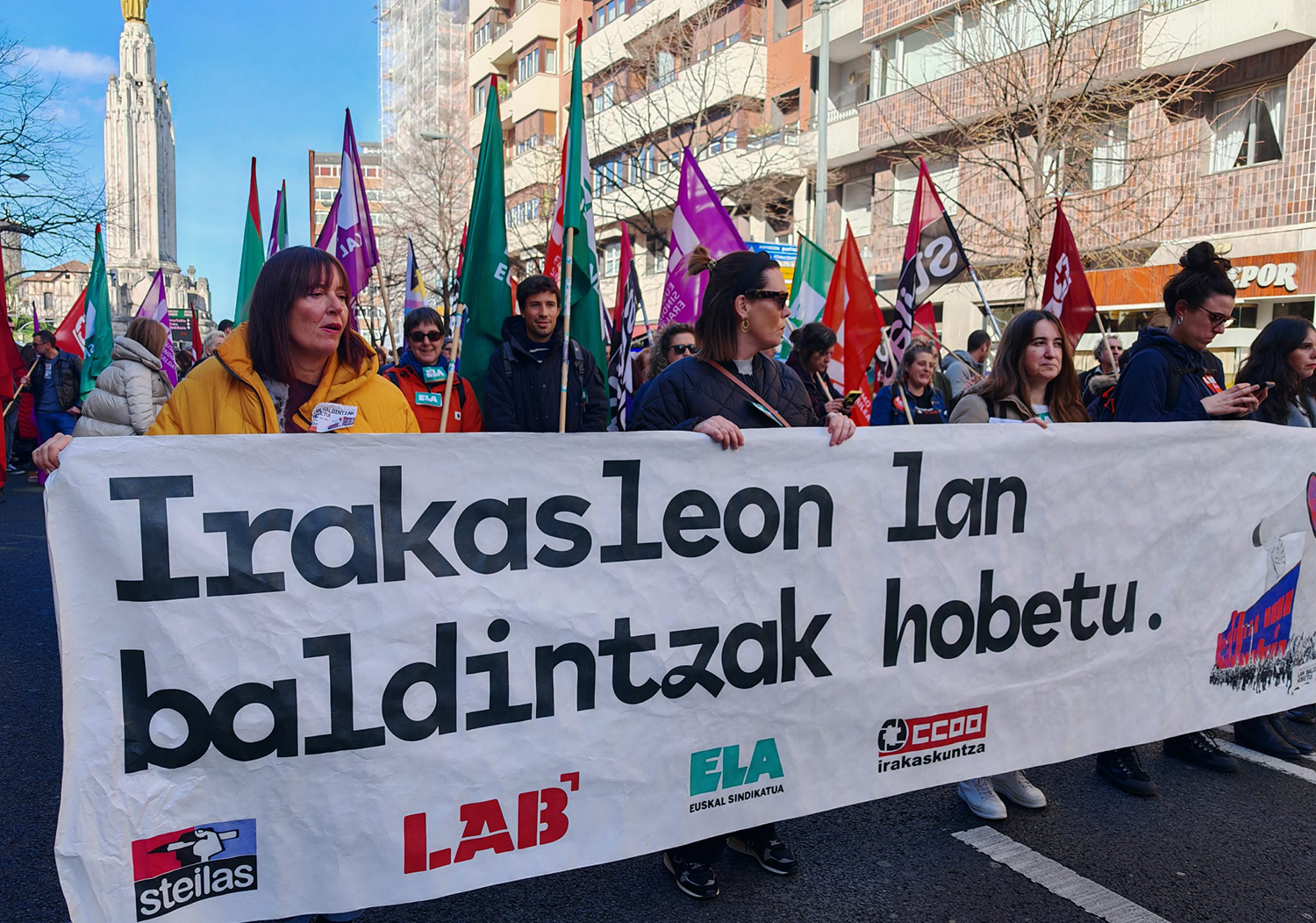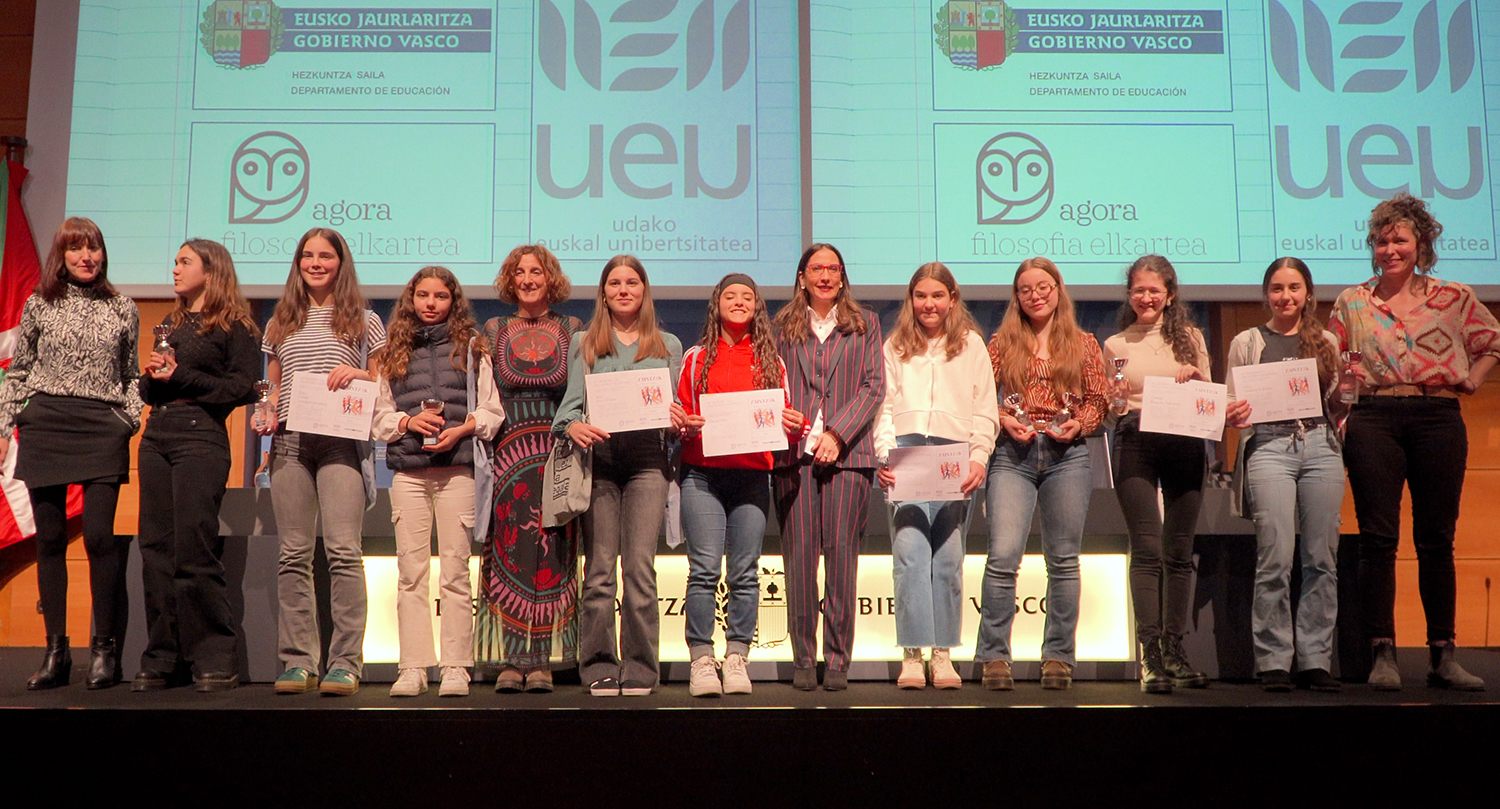"Instead of trying to change student behavior, let's change the environment."
- Children who have experienced addictions in their childhood carry the backpack loaded to school and the experience they live in school the burden even more. UPV teachers Gema Lasarte and Beatriz Garai tell us what education and educators can do in these situations. In July they organised a course on the subject. “These children don’t have to overcome math, they have to spend a time playing.”

When we talk about a child who has been addicted, what exactly are we talking about?
Gema Lasarte: It comes from the Anglo-Saxon concept Adverse Childhood Experience (ACE). According to this, in childhood there are certain addictions that can be the result of family or other dysfunctions: children who have suffered physical and/or emotional exclusion, who have suffered sexual abuse, victims of gender or other violence, people who suffer from a problem of paternal drugs or their imprisonment, people who have suffered a catastrophe, LGTB children, children who have migrated… Addiction can occur to anyone and can become a trauma. There is also the social stigma of the adicciones.En relationship with education, in the school we have “normalized” students, that is, they
are well on the way to school; we have pathological students, with some type of diagnostic and support specificity; and we have a group of students in limbo (about 15% of students according to Anglo-Saxon studies) who have no diagnosis but are not well in school. It is an area that is usually worked in psychiatry, neurosciences and medicine, but only in education.
Beatriz Garai: The adherence to an adult, the protection of the child, is fundamental so that the situations described do not end the trauma and do not become real serious problems in adulthood. But sometimes what strikes you is what you should protect yourself…
It is hard to imagine that the victims of these harsh situations described are not identified at school…
Lasarte: Yes, I mentioned the hardest ones, but in school there are many children with limbo addiction. Now I'm studying the case of a child who was doing a lot at school, and the origin of everything was the violent separation from his parents. Over time, they discovered that their parents' adherence was not good. The experience of incarcerated parents in Euskal Herria is also very close, and these incarcerations are not free, we have children with backpacks, children with a burden, but there is also the care, adherence and support of families. The school must contribute to this. And in the worst case scenario, if the child does not have love at home, the school should stop him and give him a second chance.
Garai: In the United States, for example, human rights associations began to analyse them. They saw how many blacks and Latinos expelled in high schools and how many ended up in jail. We are talking about social justice, because fundamentally this issue states that the treatment of these people by school is not fair, that it must be changed.
Gema Lasarte: "The school points out to children that they are rare and special in the eyes of others, puts them in targets and they internalize that loneliness"
What do families of children with addiction say about the school welcome of their sons and daughters?
Garai: In Spain, a questionnaire has been passed to families and children addicted to addiction, and after analyzing these results, school failure and abuse are very common in education. The automatic reaction of these students with problems is to isolate themselves or turn to violent behaviors, and in this regard it punishes or expels schools, but this is like punishing the mute person who asks to speak and does not speak. The school does not understand that the reaction of students who experience addiction is due to fear and pain, which is not something that intentionally does. Poor relationships with other colleagues and teachers are also a clear consequence.
Lasarte: Beatriz and I are teachers and parents of adopted children, and the experience of our children in school has put all these studies in place. Our children have suffered bullying in school, they have suffered in school and, as many experts say, these children do not have to overcome math, they have to spend a time playing. On the contrary, the school points out to children who are rare and special in the eyes of others, puts them in targets, and they internalize that loneliness. To alleviate, help and accompany this self-concept is what the school has to do, because parents cannot do this accompaniment from home, we cannot collaborate in this socialization in the center.
Don't teachers?
Lasarte: Children living with addiction need special care in which institutions must collaborate. Interesting support policies are targeted at families, but then we send children to school and if the school is not formed, it's over. To send these children to school today is to condemn isolation and exclusion. And of course there are teachers with a special sensitivity, willing to help, my son had such a teacher and he would always use it, but it's not widespread.
Garai: The child who behaves badly is thought to be malignant, instead of observing what may be behind this behavior. There is a great lack of information, awareness and sensitivity in this subject, due to lack of knowledge, but it is not the fault of the teachers. Teachers need training and support because they often stay alone in the classroom, with many students and with a lot of stress. It seems that the teacher's work can and does not matter, but the teacher has to be well trained and needs conditions and skills, has a very important role.
Lasarte: This year I conducted a test in a final degree work of a 19-year-old student in training as a teacher. Considering several indicators, I set out in a center to look at 215 students, to see if I was able to recognize the students who experience addiction. He identified fifteen people, shared their names with the center counselor, of whom eight were seen because they had problems at home; the rest theoretically had no personal problems. That is, on the one hand, to identify children with addiction; on the other hand, there are conflicting students, with despotic behavior in school, who seek great leadership, who think they can do what they want… and who do not have to live addiction; perhaps they have not learned to respect the limits.
Beatriz Garai: "Changing structure and methodology is beneficial not only for addictive students: a context based on positive experiences and relationships, protection and security is beneficial for all"
They say that sending children who experience school addiction is condemning those students. How should schools work with these children?
Garai: The Anglo-Saxon people who have worked more on the subject use the so-called Trauma Paradigm not only in education, but also in social services, health, etc. In Britain, for example, 300 public schools are working with this perspective, training teachers and school communities. Security, protection and experience and positive relationships are fundamental, with a clear starting point: it is suggested that what needs to be changed is not the student, but the environment, the community. If the methodology and structure change, if the education is otherwise raised, the student will also change. In our case, the conductive method predominates: the student who behaves well, the asterisk and who behaves badly, the punishment occurs in the student; therefore, the experience we propose is to influence the environment. Instead of trying to change student behavior, change the environment. In this sense, if we have partial experiences here, second-chance schools, positive discipline… but not a general approach that responds to that paradigm. I would ask to change the view of the professor and the whole community, it's not easy.
Lasarte: It's a closer experience. In Murcia, for example, the model of “caring schools”, based
on the above philosophy, is being followed and will come to the course we organized in July to make known todo.Una much of this general approach is that it takes all students into account. In short, we are all or we can be vulnerable at some point…
Garai: Yes, because changing the structure, the methodology and the environment is beneficial not only for those who experience addiction, but for all. A context based on positive experiences and relationships, protection and security is beneficial to all.
Lasarte: Here we have the very neoliberal word, inclusiveness, speech we have also created about it and we have responded legally, but the reality is null and void. If inclusiveness is to provide everyone with the education they need within their needs, it is false to do so. When you have a lot of students in the same class, how do you get the devil right to make it inclusive? And we're aware that the combination and synergy between addiction, colors, languages -- enriches each other, feeds the ecosystem, but instead we're creating two-lane education, segregated education. We are constantly classified as girls, boys, fat, rich, poor, tuntos, rapids… but we all have something to learn and teach.
Garai: It is true that it is difficult to look at everything with many students, but as teachers we are trying to change our eyes. With Pandemia, for example, students from 19 to 20 years old have come to the office telling their problems, crying… and it has never happened to me, but besides being students there are also people in front of us. They've come to me because they've seen a more sensitive attitude or, at least, an open attitude of listening, because we feed a different view, and that's what we should develop teachers, support and really listen to students.
While the paradigm shift is coming, it is no little to give this accompaniment to the students. Can you give examples of well-worn cases?
Lasarte: There are teachers who are trained in this subject and who respond well to the needs of these students. They know that these children have great problems with routines and that they have to do routines, that they have to learn to follow the norms and to make decisions, that they have to work with respect among them, that they are afraid of changes and that, therefore, we have to act carefully, that they have great difficulties to develop autonomy and empathy, that we have to help adjust the emotions… what does the teacher have to do with this? To give security to the student, to offer care and to show that he/she is open to listen to him/her, to announce that there is hope, to motivate him/her… In all centers he/she will find teachers and counselors who have been trained and who are very sensitive, but are a minority, because it is not something within the system, but is the result of a journey by themselves.
At the UPV/EHU, from 13 to 15 July, you have organized the courses “Researching and supporting the processes of schooling of children who have experienced addictions in childhood”.
Lasarte: On the first day we will focus on the theme and count the research: what to do when there are problems of addiction or addiction, how the host and adoption families experience the process of schooling their children and the possibility of social educators entering the school, which we are studying in Zuia, because the view of social educators would be very useful in the centers. The second day will be the experts in the field, especially psychologists, about schooling, attachment and lack of attachment, sexual abuse… And the message of the last day is that addiction has a solution, and we will meet resilient teachers and experiences both local and Murcian. Our goal is to put this uncomfortable issue on the table, because we are all partly responsible.
Garai: And let the course be a forum for debate and synergies.
.jpg)
Matxismoa normalizatzen ari da, eskuin muturreko alderdien nahiz sare sozialetako pertsonaien eskutik, ideia matxistak zabaltzen eta egonkortzen ari baitira gizarte osoan. Egoera larria da, eta are larriagoa izan daiteke, ideia zein jarrera matxistei eta erreakzionarioei ateak... [+]
Elgarrekin izena du Duplak egin duen aurtengo abestiak eta Senpereko lakuan grabatu zuten bideoklipa. Dantzari, guraso zein umeen artean azaldu ziren Pantxoa eta Peio ere. Bideoklipa laugarrengo saiakeran egin zen.
Leporaturikoa ez onarturik, eta sare sozialetako kontuak "lapurtu" zizkiotela erranik, salaketa jarri zuen Arabako campuseko Farmazia Fakultateko irakasleak. Gernikako auzitegiak ondorioztatu du ez dagoela modurik frogatzeko mezu horiek berak idatzitakoak diren ala ez.
Seme-alabek eskolan dituzten ratioekin kezkatuta, Arartekoari kexa helarazi zion guraso talde batek, eta orain zuzenean Parlamentuari egin diote eskaera, “legez berma dadin gure seme-alaben hezkuntzaren kalitatean oinarrizkoa den neurria, unean uneko aurrekontuez edo... [+]
Ikasleen lan politikoa jazartzeko asmoz, Iruñeko Iturraman eta Biurdanan nahiz Bilboko Unamunon izan dira polizia-indarrak, IAk salatu duenez.
Memoria eta Bizikidetzako, Kanpo Ekintzako eta Euskarako Departamentuko Memoriaren Nafarroako Institutuak "Maistrak eta maisu errepresaliatuak Nafarroan (1936-1976)" hezkuntza-webgunea aurkeztu du.
570.000 familiak euren haurren ikasgeletako hizkuntza nagusia zein izango den bozkatzeko aukera dute martxoaren 4ra arte: gaztelera edo katalana. Garikoitz Knörr filologoaren eta euskara irakaslearen arabera, kontsultak "ezbaian" jartzen du katalanaren zilegitasuna... [+]
Uribe Kosta BHI institutuko hainbat ikaslek salatu duenez, mezu "iraingarriak, matxistak eta homofoboak" jaso dituzte Batxilergoko beste ikaskide batzuengandik. Horrez gain, gaineratu dute mezuak irakasle bati ere bidali dizkiotela eta beste ikasle batzuen... [+]
Aiaraldeko hainbat irakaslek mezua igorri diete ikasleen guraso eta familiei, dagoen informazio zurrunbiloan, grebarako arrazoiak modu pertsonalean azaltzeak euren borroka eta lanuztea hobeto ulertzeko balioko dielakoan.
Euskal hezkuntza sistemaren itunpeko eskolen gainkontzertazioa eta zentro pribatuen umeak hartzeko gaitasuna beherakada demografikoari eta biztanleriaren klase osaketari egokitu behar dira.
Grebaren bezperan Hezkuntza Sailak “edukirik gabeko” mahaia deitu zuela eta sindikatu deitzaileak “errespetatu gabe” akordioa “antzezteko” gutxiengoa duten sindikatuak “erabili” nahi izan zituela salatu ostean, beste bi greba... [+]
Nola azaldu 10-12 urteko ikasleei bioaniztasunaren galerak eta klima aldaketaren ondorioek duten larritasuna, “ez dago ezer egiterik” ideia alboratu eta planetaren alde elkarrekin zer egin dezakegun gogoetatzeko? Fernando Valladares biologoak hainbat gako eman dizkie... [+]
Une delikatua igarotzen ari den zure lagun minak Taylor Swiften kontzertura joatea proposatu dizu, baina kide zaren elkarte ekologistak elkarretaratzea deitu du, abeslariak sortuko duen kutsadura salatzeko; nora joango zara? Dilema etiko horri erantzun diote gazteek, baita... [+]
Lau mila karaktere ditut kontatu behar dudana kontatzeko. Esan behar ditut gauzak argi, zehatz, soil, eta ahalko banu polit, elegante, egoki. Baga, biga, higa. Milimetrikoki neurtu beharra dut, erregelaz markatu agitazioa non amaitzen den eta propaganda non hasi. Literarioki,... [+]
The time has come for us to enrol in schools in the Basque Country for the 2025-26 academic year, and in many homes the youngest of the household will take a new step soon, in September, which is schooling. Proud of the Basque Public School The members of Topagune are firmly... [+]











